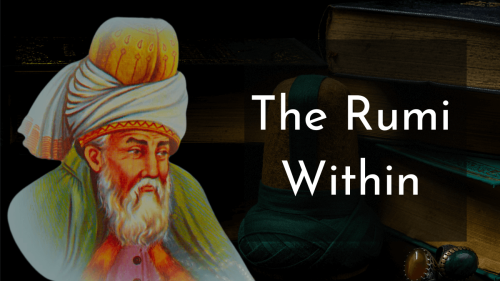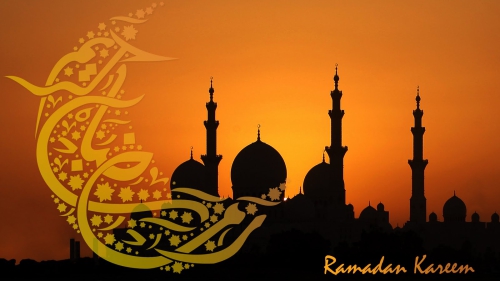Rumi Poet of the Heart

Come, come whoever you are -wanderer, worshipper, lover of leaving. It doesn't matter. Ours is not a caravan of despair.
Come, even if you have broken your vow a thousand times. Come, come yet again, come.
This was the first poem I read by Jelaluddin Rumi, the 13th Century Sufi mystic, and I knew immediately that I had a friend.
In just a few short lines he made it clear that he knew me (and most everybody else!) through and through -and loved us all unconditionally anyway.
There is such hope and encouragement in those lines. Reading more of his work I soon found out that, compassionate as he was, Rumi could be equally fierce with
hypocritical or weak-spirited behavior. Gamble everything for love if you're a true human being. If not, leave this gathering. Half-heartedness does not reach into majesty.
You set out to find God, but then you keep stopping for long periods at mean-spirited roadhouses. To this day, the more I enter Rumi's world, the more I discover the many-layered richness and variety of the perspectives he gives on life. This Year marks Rumi's 800th birthday. Throughout these centuries, his work has inspired, encouraged, and delighted millions throughout the Middle East and beyond. Although Rumi began to be widely known in the English speaking world only about a hundred years ago, interest in his poetry has exploded to such an extent in recent years that he become the best-selling poet in America. Popular icons such Deepak Chopra, Wayne Dyer, Demi Moore, and Julia Cameron quote him and express gratitude for the gifts he has brought into their lives -which they share with their large audiences. There is a moving story of Leonard Bernstein, the night before he died, asking for several Rumi poems to be read to him over and over. But it's not just celebrities who have embraced Rumi. You find his poetry quoted in a huge variety of places -in books on creativity, psychology, and business, in self-help and spiritual books, on calendars, bookmarks, greeting cards. Calligraphers decorate his lines on hand made paper, illustrators paint his passionate images of love, dancers whirl to his mystical metaphors, and musicians improvise while poets recite his ecstatic verses. In recognition of his world-wide influence, UNESCO designated 2007 as The Year of Rumi. Rumi was born in 1207, near the city of Balkh, in what is now Afghanistan. During his childhood his family moved a number of times, fleeing before Genghis Khan's armies, finally settling in Konya, Turkey. One of the first legends about Rumi comes from this time of traveling.
It is said that a great poet and teacher, Fariduddin Attar, recognized Rumi's greatness even as a boy. Seeing the young Rumi walking behind his father, (Bahauddin Walad, a highly respected theologian and mystic, and head of a medrese, a dervish learning community) Attar said, "Here comes a lake, followed by an ocean." After his father's death, when Rumi was still in his early twenties, he became head of the medrese, quickly gaining a reputation as a great scholar, with many students. However, he himself continued to study with several renowned teachers, to deepen his understanding both on an intellectual and mystical level. He also married, fathered four children, and from the letters one of his sons preserved from this time, we know that he was actively involved in the practical affairs of the life of the community, as well as guiding it spiritually.
With all his knowledge and growing fame, it is said that Rumi knew his studying was incomplete and limited; he longed for deep transformation, not just more learning. Legend has it that, at the same time, a wild mystic, hermit and wanderer, Shams of Tabriz was praying to meet someone who yearned for God in the same passionate way he did, someone who could hold what he had to give.
He asked inwardly again and again, "Who will be my friend?" Finally, a reply came in the form of a question. "What will you give?" Shams replied instantly, with no hesitation, "My life." "Your friend is Jelaluddin Rumi in Konya." There are many stories about their initial meeting. In my favorite one, Rumi, then thirty seven years old, was sitting by a fountain in a square in Konya, reading to his students from rare books that included his father's writings on divine love. Suddenly, Shams pushed through the crowd and knocked all his books into the water. Rumi cried out,
"Who are you and what are you doing?" Shams replied, "It's time for you to live what you've been reading about." Seeing Rumi looking despairingly at the precious books in the water, Shams reached into the pool and brought one up -dry. In some versions of the story Shams proceeded to restore all the miraculously dry books to Rumi -who now understood the dryness of mere intellectual knowledge. In others versions, when Shams offered to retrieve them, Rumi turned away from the books and said, "Leave them". Either way, the incident was symbolic of Rumi's initiation into a whole new level of experience, leaving behind his old way of perceiving the world.
Shams and Rumi secluded themselves for many days at a time, completely absorbed in sohbet, mystical conversation. Andrew Harvey, a contemporary Rumi scholar and translator says, "A massive transformation of Rumi's heart and whole being now began to take place in a transmission from Sham's heart to his. Shams knew he had very little time and that Rumi had to be utterly remade so that the revelations he was destined to transmit would be potent in him." Part of the reason Shams knew he had little time was that he was twenty or more years older than Rumi. But another, more compelling reason, was the growing jealousy of Rumi's disciples, seeing the great influence Shams had on their teacher. Shams was forced to flee from Konya to Damascus.
Rumi, overcome with grief at the separation, sent his son, Sultan Velad, to bring Shams back. But the jealousy and hatred of Rumi's students soon flared up Rumi: Poet of the Heart In 1976, Robert Bly handed Coleman Barks a scholarly translation of Rumi and growled, "These poems need to be released from their cages." again, and this time when Shams left -some say Rumi's disciples murdered him -he did not return. This is when the Rumi whose poetry has come down to us through the centuries begins to emerge. According to legend, holding on to a pillar in his courtyard, Rumi began to turn around and around the pole, (this later became the basis of a core practice of the Mevlevi order of Sufi whirling dervishes) spontaneous poetry of intense longing pouring out of him. Students copied down his lyrics as he kept spinning in his grief. He traveled twice to Damascus, hoping against hope that he would find Shams.
It was on his second trip, several years after Shams' disappearance, that a great revelation came to Rumi. He suddenly understood, experienced at the core of his being, that he and Shams were one -he carried Shams within himself. In a poem from that time Rumi expresses their total merging in an unbreakable bond of soul friendship. "Although I am far from you physically, without body or soul, we are one single light...I am him, he is me, O seeker." This theme of union comes up again and again in Rumi's poetry in a wide variety of ways. It's in his gorgeous images of the lover and the Beloved, Lovers don't finally meet somewhere they're in each other all along. In the powerful lines denouncing all divisions of religion that cause conflict between people, Two hands, two feet, two eyes, good, as it should be, but no separation of the Friend and your loving.
The Crazy Wisdom Community Journal September - December 2007 Page 16 Domenic Tamborriello is a clinical social worker, who is also the primary organizer of RumiNations800, an Ann Arbor celebration of Rumi's 800th birthday, September 28-30. He said, "No one has braided the rope of the human with the rope of the divine like Rumi. Every poem is a love poem to God, or as Rumi would say, to the Beloved. He can find the presence of the Beloved in a drop of the ocean and help us become both that drop and the ocean itself." As I talked with people about Rumi, it seemed that everyone -poet or not -gave amazingly poetic answers, Rumi's deep influence shining in their replies.
Mahmoud Moallemian is a member of the Academic Computing and Network services at Michigan State University. Born in Iran, he has lived and worked in the US since 1982."Rumi's poetry has taught me that love and tolerance are essential parts of living, especially in today's world." And then he begins to quote Rumi by heart, From love thorns become flowers...From love vinegar becomes wine...From love fury turns to mercy...And he continues reciting, each line beginning with, "From love..."Everyone I asked about Rumi responded by talking about love in one form or another. Sepideh Vahidi, Iranian singer, painter and graduate student in Fine Arts at the University of Michigan, summed it up most simply, most eloquently. When I asked her, "What are the two or three most important teachings of Rumi -to you, personally?" She replied, "To be in love, to be in love and to be in love. "Rumi's love knew no boundaries. The clear bead at the center changes everything.
There are no edges to my loving now. I've heard it said there's a window that opens from one mind to another, but if there's no wall, there's no need for fitting the window or the latch. It was, and is, a love meant to dissolve what separates us from each other and from God -whatever our conception of God is. When Rumi died, on December 7th, 1273, his funeral procession included Christians, Jews, Moslems, and members of other faiths, all coming to honor the man who taught and so fully embodied universal love, a love that transcended religion, race, nationality and all the other artificial barriers humans put up between each other. This may be why, 800 years after his birth, he continues to inspire people all over the world -perhaps now more than ever -with a bright hope; that we can each live our lives in touch with our divine source, and from this core of our being, share with each other a profound vision of oneness.
Laz Smolovits is a writer for www.crazywisdom.net
The Crazy Wisdom Community Journal September - December 2007 Page 17
Topics: Heart, Rumi Values: Love, Spirituality
Views: 6298
Related Suggestions

















